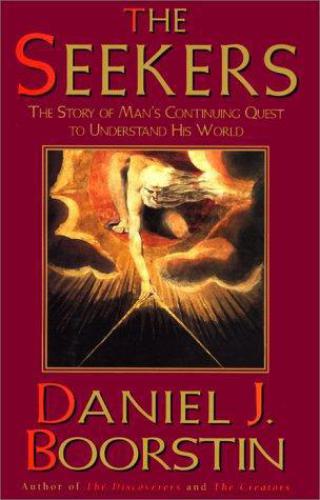
The Seekers
The Story of Man's Continuing Quest to Understand His World
کتاب های مرتبط
- اطلاعات
- نقد و بررسی
- دیدگاه کاربران
نقد و بررسی

August 31, 1998
In The Discoverers (1983), Boorstin introduced readers to scientists, explorers, historians and other pursuers of knowledge. Ten years later, The Creators did the same for innovators in art. "We glory in their discoveries and creations," he writes in the introduction to his latest, "But we are all Seekers. We all want to know why." Starting from that perhaps overbroad premise, Boorstin begins with an examination of Hebrew prophets and Greek philosophers--those who seek from a higher authority and those who seek from within. From this point on there are rather few religious seekers; instead most are philosophers of systems, of systems for discovering truth (the reason of Descartes, the empiricism of Locke, the individual experience of Kierkegaard) or for describing it (the encyclopedia of Diderot, the cultural cycles of Spengler, Hegel's World-Spirit). Certain subjects seem rather out of place, and chapters like that on H.G. Wells and John Reed, another on Oliver Wendell Holmes and E.O. Wilson; and individual chapters on Samuel Beckett, Lord Acton and Andre Malraux, have the feel of an insatiable polymath's chapbook. There are many movements, many people and many big ideas here, all expounded with Boorstin's characteristic enthusiasm and breadth of knowledge. It's perhaps inevitable that in such a broad survey some simplification would slip in--e.g., identifying 13th-century universities as centers for training gentlemen, rather than for offering professional training in theology, law and medicine. But what Boorstin does so well is bring together many ideas that fertilize and cross-fertilize the reader's imagination and curiosity. Author tour.

May 1, 1998
After New York Times best sellers The Discoverers and The Creators, a study of "seekers" who asked the big questions.

May 1, 1999
YA-The Seekers is the final book of Boorstin's trilogy, the previous two being The Discoverers (1983) and The Creators (1992, both Random). In his earlier volumes, the author recounts "our legacy of the sciences and the arts...discoveries and creations." This book deals with the question of our existence and the great figures in history who have probed its mysteries. "Book One: An Ancient Heritage" includes the prophets (Moses, Isaiah, Job); the philosophers (Socrates, Plato, Aristotle); early Christianity (church, monastery, and university); and Erasmus, Luther, and Calvin. "Book Two: Communal Search" deals with Homer, Herodotus, Thucydides, Virgil, Thomas More, Bacon, Descartes, Machiavelli, Locke, Voltaire, Rousseau, Jefferson, and Hegel. "Book Three: Paths to the Future" brings us into the 20th century with Marx, Spengler, Toynbee, Carlyle, Emerson, Kierkegaard, William James, Acton, Malraux, and Bergson, and concludes with Einstein. Boorstin's engaging narrative will help young adults unravel the arcane literature of the past and perhaps spark interest in subjects otherwise thought beyond their reach.-Pamela B. Rearden, Centreville Regional Library, Fairfax County, VA
Copyright 1999 School Library Journal, LLC Used with permission.

August 1, 1998
Boorstin--distinguished historian, prizewinning author, and former Librarian of Congress--interpreted the grand undertakings of science and art in "The Discoverers" (1983) and "The Creators" (1992) and now tackles the manifold realm of religion and philosophy. "We are "all" seekers," Boorstin declares, endlessly attempting to define the purpose and meaning of life, and we have been guided in our quest over the centuries by certain haloed individuals. The first such leaders Boorstin analyzes are the ancient Hebrew prophets, followed by the ancient Greeks, particularly the "matchless trinity" of Socrates, Plato, and Aristotle, as well as Herodotus and Thucydides, the men responsible for the "birth of history." He then deftly handles the life of Jesus, the evolution of Christianity, and the rise of the church as the defining force in European civilization. Next up are such revolutionary figures as Descartes, Voltaire, Marx, Carlyle, and Kierkegaard. Unfortunately, Boorstin falters toward the end of his illuminating and thoroughly engaging survey, as though overwhelmed by the plurality of modern thought, and resorts to a hurried roll call like a professor at the bell: Malraux, Beckett, Einstein, see you next time . . . ((Reviewed August 1998))(Reprinted with permission of Booklist, copyright 1998, American Library Association.)

























دیدگاه کاربران